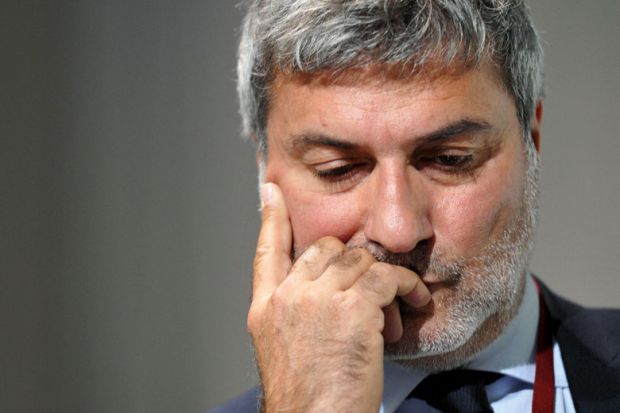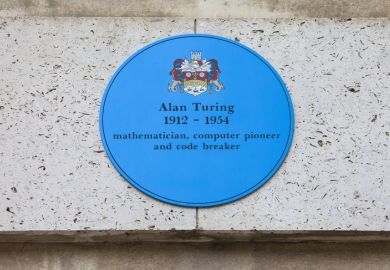Hiring someone for a job is always a big decision. But the Karolinska Institute’s 2010 decision to appoint as a visiting professor Paolo Macchiarini (pictured above), once a world-renowned thoracic surgeon, turned out to be really big.
Following the deaths of two of Dr Macchiarini’s patients at the Karolinska University Hospital and allegations of research misconduct, a TV documentary on his work shocked the Swedish public and led the Karolinska Institute’s board to commission an external inquiry into the institution’s handling of his case.
After the inquiry published its highly critical findings on 6 September – saying the institute had a “nonchalant attitude towards regulations” – Sweden’s higher education minister removed the institution’s board and fired one of its former vice-chancellors, Harriet Wallberg, from her post as head of the Swedish Higher Education Authority and chancellor of all the nation’s public universities.
Professor Wallberg and another former KI vice-chancellor, Anders Hamsten, have also been removed from the institute’s Nobel Assembly, which is responsible for awarding the Nobel Prize in Physiology or Medicine.
The scandal has shaken the Stockholm medical institution, one of Europe’s most prestigious universities (it was continental Europe’s second highest placed university in the 2015-2016 Times Higher Education World University Rankings, at 28th).
Were systemic problems at the Karolinska Institute to blame? Or does the affair show how individual errors can have huge consequences for universities?
Dr Macchiarini’s recruitment “was pushed through inappropriately” and was “initiated by then vice-chancellor” Professor Wallberg, according to the external inquiry into the case, led by Sten Heckscher, a former president of Sweden’s Supreme Administrative Court.
The institute “received remarkably negative references, including information that Macchiarini had been blocked from a professorship in Italy, that there were doubts surrounding his research and that his CV contained falsehoods”, continues the report.
In a 2011 operation at the Karolinska University Hospital that attracted worldwide headlines, Dr Macchiarini performed the world’s first synthetic organ transplant by replacing a patient’s windpipe with a plastic tube coated with stem cells. He went on to conduct a further two such operations.
Of the three patients he operated on, two died and the third developed severe complications that have required continuous hospital treatment.
In 2013, the university hospital stopped any further operations and terminated its part of Dr Macchiarini’s contract.
But the Karolinska Institute extended his contract in 2013 and 2015 “without any evaluation of his activities”, says the external inquiry report.
In August 2014, research misconduct allegations against Dr Macchiarini concerning his publications were reported to Professor Hamsten, who succeeded Professor Wallberg as vice-chancellor in January 2013.
A separate independent investigation, carried out into Dr Macchiarini’s operations at the university hospital, says: “The vice-chancellor appointed an external investigator [Bengt Gerdin, emeritus professor of surgery at Uppsala University] who found that the accusations against Macchiarini were essentially correct. However, the vice-chancellor decided to acquit Macchiarini of the accusations of research misconduct.”
Swedish public TV station STV broadcast a three-part documentary, The Experiments, concerning Dr Macchiarini’s transplants in January 2016 – including images of a young woman who died after surgery in Russia.
The Karolinska Institute’s board launched the inquiry in February and Professor Hamsten resigned. He was replaced by Karin Dahlman-Wright on an interim basis.
Dr Macchiarini, who has denied all the allegations against him, was fired by KI in March. Prosecutors in Sweden said in June that they were investigating him on suspicion of two cases of involuntary manslaughter at Swedish hospitals.
In April, The Lancet added an “expression of concern” to a 2011 paper by Dr Macchiarini.
This month, Sweden’s Central Ethical Review Board found Dr Macchiarini and his co-authors had committed research misconduct in a 2011 Nature Communications paper.
Hans Wigzell, who was vice-chancellor of the Karolinska Institute between 1995 and 2003, said that at the highest levels of the institute a “lack of allowing information to easily come in…has been a significant part” of the affair.
But he added that the case tells us “nothing about the general standard, the quality of research” at the institute.
He continued: “My experience from my relatively long life in these kinds of areas is that people think it’s something wrong with the system. It’s not the system – it’s the individuals.”
Professor Gerdin said that “this terrible process took place in one single department out of 22 departments”.
But he added: “The current Karolinska Institute leadership, and the current vice-chancellor, has not yet dismissed any one of those employed internally at KI based on the current investigations. If that will not be the case…it is a scandal.”
Asked what lessons should be learned from the case, he called for improved processes “for documentation of scientific work” by researchers, in employing newcomers who are “not yet full professors at any other respected university”, and for handling allegations of research misconduct.
The Heckscher report also says “structural circumstances” may have had an impact, including “research policy developments and a growing fixation on excellence...and the aspiration to close the gap between research and its application in healthcare”.
Professor Dahlman-Wright said in a statement that the Karolinska Institute has “much to learn from what has happened and now we are undertaking extensive work”.
The institution has “strengthened recruitment processes in terms of review and assessment of CVs, and verification of references”, and has “altered the process for handling suspected research fraud”, she said.
She added: “Now it is up to us to prove that Karolinska Institutet is so much more than the Macchiarini affair.”
POSTSCRIPT:
Print headline: Karolinska Institute scandal: the system or the surgeon?
Register to continue
Why register?
- Registration is free and only takes a moment
- Once registered, you can read 3 articles a month
- Sign up for our newsletter
Subscribe
Or subscribe for unlimited access to:
- Unlimited access to news, views, insights & reviews
- Digital editions
- Digital access to THE’s university and college rankings analysis
Already registered or a current subscriber? Login




